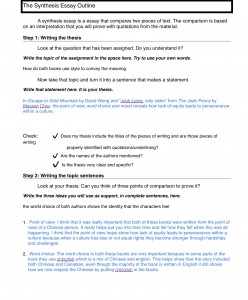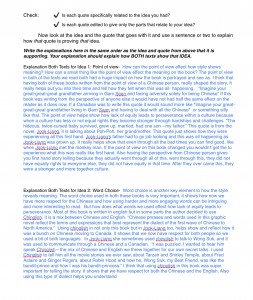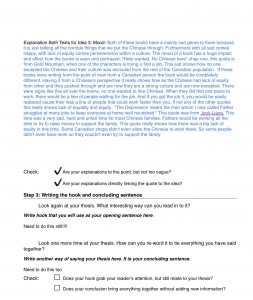Where do I even begin?… Lets just start with, synthesizing isn’t really my thing. We were asked to read a graphic novel called Escape to Gold Mountain, which from my perspective was not the most entertaining and engaging book. Little did we know that after reading this book we would read another book and write a whole essay comparing them. The second book we read was the Jade Peony, this book I found a bit more interesting to read but still not as you would say, my type of read. Once we finished both these books, our lovely teacher Ms Willemse, informed us that we will be writing a synthesis essay comparing these two books. Like what the heck does a synthesis even mean? I don’t think I even knew what synthesizing meant. At this moment I knew that this was not going to be fun! Anyways carrying on with the story, Ms Willemse said that the essay was going to be on how style reveals meaning! Like what the heck does that even mean? This took me a while to fully understand and figure out what she was asking for.
(This is kinda how I felt)
Firstly we had to create a venn diagram, on one side was the Jade Peony and on the other side was Escape to Gold Mountain. In the middle of the two circles was their similarities. We were comparing the two books by there style, which means their pov, tone, mood, word choice, etc. This was probably the easiest step of this whole process, because you just had to have read the books to be able to compete this. But the next two steps made you want to pull all your hair out. This was my venn diagram…
Secondly she gave us a outline form and we had to fill it out so it made it a lot easier to write your essay. On the outline we were told to write out our thesis, topic sentences, quotes,intro, and conclusion. During this class, not going to lie, I sat at my desk looking around at my hard working class, while I had no clue what we were doing. I was listening to everything Ms Willemse said, but my brain was not processing the information. Later that night I asked my best friends what the heck Ms Willemse was talking about and she explained it all to me, until I understood it, thank you so much Gabi. I know that I should have asked my teacher when I was confused but…, I actually don’t remember why I didn’t ask for help. Next time I am confused I defiantly will ask for help to clear my understanding. My outline ended up looking something think this…
And finally it was time, by this point you have only half a head of hair cause you got frustrated with the outline form and pull it out. The actual writing of the essay, I found very hard to find good words to use to connect all my ideas. Once I started, I stopped a a lot cause I was not very interested, which meant I procrastinated and didn’t do a very good job at connecting each paragraph. I would likely write a paragraph then take a hour long break and then continue writing, which was a long and very painful process. Once I finished writing, I was probably one of the happiest people on earth until I got a notification from Ms Willemse on iTunes U for more worksheets… yay
Here is my final product…
“Style Reveals Meaning
The authors from both these books decided to use point of view, word choice, and mood to show when the Chinese immigrants came to Canada during the 1900’s, it was really depressing, sad, challenging and tough for them. They were not excepted for who they were as a person nor did people want them to get a job or to even live close to them. In Escape to Gold Mountain by David Wong and “Jook-Liang, only sister” from The Jade Peony by Wayson Choy, the point of view, word choice and mood reveals how lack of equity leads to perseverance within a culture.
Chinese were very mistreated during this time period, and the authors of Jade Peony and Escape to Gold Mountain are really trying to show this. The point of view in a book is one of the most important key factors that the author has to figure out. In both of the Jade Peony and the Escape to Gold Mountain, the author had to make a decision on what point of view they wanted their book to be told from and who they wanted to actually tell it. This decision effects the rest of the book and how it is portrayed and illustrated. Both of these books are written from the point of view of a Chinese person, it gives you a first hand view on what life was really like and how hard it was. Moreover it gives you a more of a personal story and experience. Having the point of view from a Chinese person helps show now at a time where equity lacked, people came together within a culture to become stronger as a whole. In Canada back then, the Chinese were very disrespected as seen in the book Jade Peony and Escape to Gold Mountain and it was very hard to find a job and no one around liked you. Just “Imagine your great-great-great grandfather arriving in Gam Saan and facing adversity solely for being Chinese” (Wong). Having to go through all of this inequitable discrimination, actually made the Chinese become stronger not only as one but as a whole. Having the point of view through a young Chinese child’s eyes majorly puts the story on a more personal and connected level. As Jook-Liang said, “The hideous [Poh Poh], twice-cursed baby survived, grew up, married, had one son—my father” (Choy). When the book is being told from the eyes of a young child it really shows you that all these horrible actions actually happened, and Chinese were put through all so much but in the end they came out way stronger then when they went in. Having the perspective from a Chinese person gives you the first hand story telling because they actually went through all of this. They did not have equal rights compared to everyone else, nor did they have equity in that time period. After they managed to over come and persevere through all this, they were not only stronger but also a more connected culture.
The authors of Jade Peony and Gold Mountain both had to decide how they wanted to write their book. The word choices in a book, is very important to how the story is seen and portrayed. In both of these reads, the author decided to use Chinglish as a way to connect with the readers. Chinglish is a mix between English and Chinese, this helps include both sides of the story and make the story feel more binned. Escape to Gold Mountain uses “Chinese phrases and words (…) [to] reflect the terms and expressions that best represent the dialect of the first wave of Chinese to North America.” Using Chinglish in not only this book but in Jade Peony too, helps show and reflect how Chinese immigrates were moving to Canada. Furthermore it shows that we now have respect for both cultures, so we used a bit of both languages. In Jade Peony, Jook-Liang said “ I wanted to hear [Wong Suk] speak Chinglish—the mix of Chinese and English we threw together for our own secret talks” (Choy). Jook-Liang use Chinglish to talk to Wong Suk about different types of things, they kind of think of this as their own little secret language. In Chinglish they talk “about Tarzan and Shirley Temple, about Fred Astaire and Ginger Rogers, about Robin Hood and how he, Wong Suk, my Best Friend, was like the bandit-prince and how I was his bandit-princess” (Choy). Also speaking in Chinglish helps the Chinese immigrants feel as if they are fitting and blending in with the Canadians more. Their identity also changes as they speak Chinglish. The Chinese are already feeling excluded with everything that has happened, but speaking Chinglish makes them feel as if they are more connect as one community with the Canadians
Neither of these books are very happy, but they both defiantly have happy parts. The main mood throughout the books is sad, yet forgiving in the end. Furthermore with all sad comes happy, with lack of equity comes perseverance within a culture. The authors main goal is to set a mood for the book that you will feel when reading the majority of the book. Jade Peony and Escape to Gold Mountain both convey a mainly sad genre, because they are talking about all the bad things that the Canadians put the Chinese through. The Chinese in Canada were not excepted as people, people didn’t want them working at their stores, so it was really hard for a Chinese male or female to find work to help them support their family. In Escape to Gold Mountain one of the characters was trying to find a job and came across a sign that read “Help wanted, No Chinese here” (Wong). Only a few stores would allow Chinese to work there and by the time you found one of these stores their would already be a line of other people wanting the jobs. This just shows how no one excepted the Chinese and their culture was excluded from the rest of the Canadian population. The Chinese were going through a super hard time, not being able to support their family and feeling like you are no wanted every where you go is so sad and depressing. Even someone as innocent and young like Jook-Liang had to experience such misery throughout her family. “The Depression meant the man whom I now called Father struggled at many jobs to keep everyone at home well nourished” (Choy), Jook-Liang explained. People don’t fully understand that through hard times when you preserve you will eventually overcome the challenge or obstacle and become a stronger person. And that is exactly what is happening in these two books, the Chinese completely not equitable with all the Canadians around them but they manage to preserver through it all to became a stronger culture.
Both of the authors achieved to incorporate point of view, word choice, and mood into both of their stories to tell and inform the reader about the past history with Chinese immigrants to Canada. When the Chinese had to cope with all the horrible things that us, Canadians put them through, they went through a whole lot of perseverance, determination, and hardship to come out a stronger and a more connect culture. When you are looking at a culture, you don’t realize all the struggle and perseverance that went behind it to make it a stronger and more powerful culture. In Escape to Gold Mountain and Jade Peony the point of view, word choice and mood reveals how lack of equity leads to perseverance within a culture.”
Overall I found out that I don’t like synthesis essays as much as I would hope to, and I learned that you should not procrastinate even if you don’t enjoy what you are doing.






